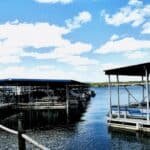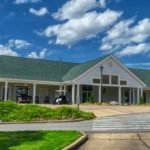At the Board Discussion Session on February 2, 2022…
Larry Siener, Chair of the Finance and Planning Committee said, “I won’t go into a lot of detail. I’m just going to give it a quick overview and open the floor for any questions or comments you all might have.”
Siener: “We talked earlier and you’ve had this policy in your hands for a little while. We have three accounts that are currently titled in our documentation, ‘Reserve Funds’. We retitled those documents on Finance and Planning [Committee], ‘Emergency Reserve Funds’. We revised the policy accordingly to make it very clear that those funds are there really only to be used in the case of a ‘no joke’ emergency. You’re not going to pay day-to-day bills with those.”
Siener: “That would be an act of God situation. You know, like we may receive tomorrow – somebody skids down a hill, slides off the road, smashes into a pumphouse at a sewer plant, and all of a sudden the sewer plant is down. You have to spend $500,000 or $600,000 to fix it, as a hypothetical example.”
Siener: “That information is a companion to the new policy. That policy is currently titled, ‘Fixed Asset Funds’.
Siener: “Again, if you look in our existing documentation, there are two funds that the Board established last year that are currently titled, ‘Capital Funds’. There is a Utility and a Non-Utility Capital Fund. A fairly simple breakdown between those – anything supporting water and sewer is going to be Utility Fund. Anything else is going to be a Non-Utility Fund.”
Siener: “The funds were established. There were no governing documents covering the procedures associated with the creation, maintenance, and usage of those funds. The documents you are looking at today are the documentation that sets those policies around that set of funds.”
Siener: “We did make a wording change. Lucky enough that of the nine people that are on Finance and Planning [Committee], we have three accountants. And the three accountants got together and said, ‘Capital is not the right term to use here. A more appropriate accounting term would be Fixed Assets, so we changed the title from Capital Funds to Fixed Asset Funds.”
Siener: “The procedure you have in front of you, the process you have in front of you is basically the funding philosophy – how the Board can handle the funds. How they are expended. How they are evaluated. How the General Manager and the Controller evaluate the need for those funds and report to the Board and public on what those characteristics are.”
Siener: “Does anybody have any questions about the specifics of what’s in these documents?”
Board Chair Joanie Corry asked if anyone had any questions.
Pam Avila, Board Director: “Since Coreena is our Controller and this is really her thing. Does this work for you?”
Coreena Fetterhoff, Controller: “Yes. Just to get a little bit of further detail…I think the majority of you are aware, cash flow is always a concern. We have been in a little bit better position over the last two years with everything that has gone on and the PPP forgiveness and so forth.”
Fetterhoff: “Typically what has happened is we’ve gone out and we’ve purchased all of our capital – our fixed asset purchases in anticipation of revenue coming in throughout the year. What this fund really does is everything that we were able to set aside, we want to be able to start having the funds on hand first before we go and start making these purchases. That way we are monitoring our cash flow in a better manner and what this is going to allow us to do is to get things in a timely manner and allow us to save for the expenses that we know are coming up down the road. We have some large investments that we are going to need to make, eventually. This is to help us make sure we get down to where we need to be. As Larry says, it was decided if we could turn our prior two reserve funds into ‘approved emergency, break the glass’, type of emergency funds. We don’t know what the future holds…”
Fetterhoff: “Let’s start using these funds. Let’s start setting aside what we can, what we need to so that we can prepare for tomorrow. And that is what this is…” I think it is a good decision for us, going forward.”
Tucker Omohundro, Board Vice-Chair: “I am a little bit confused. You are saying we are going to set this aside for ‘break the glass,’ but yet you are talking about using it to buy things ahead of time.”
Siener: “These are two different sets of funds. The emergency reserves are, ‘put it behind the glass, only touch them when you absolutely need to’.”
Siener: “These funds, unlike those funds are a little bit like your short-term savings account and your home account. This is money you actually intend to spend. You either can use it to early start activity because we are a cash-based accounting organization and we start over every January. There may not be sufficient funds to start a capital activity for three, four, five months into the calendar year, under our current model. The problem with that is by the time you get it contracted, but the time you get the services delivered, by the time it’s billed, you are now out of the calendar year and you’ve got carryover from one year to the next which is one of the reasons why we have very large carryover budgets on work in process from year-to-year.”
Siener: “Using this money, we know we’re going to get the income, but we know it’s not going to show up for three or four months, we can take money out of these fixed asset accounts – early start that activity – get the suppliers under contract – get the work done – get it billed and collected – get everything done inside the calendar year. So it cuts down on the…It makes a more efficient operation and it’s not this mad scramble in the last four or five months of the year to try to get things done.”
Siener: “The other thing you can do, for example in the FRATF, we talked about an ‘unknown unknown’ – the need to put a couple of water tanks over on the east side of the Village to maintain water pressure, five or six years down the line. If we know how much that is going to cost and we know about when we need to do it, we can take money and set it aside in these Fixed Asset Funds and basically save up for that expenditure that we know we are going to have to make. That way, when it comes time, when ’23, ’24, ’25, whenever it is, that we actually have to go make that expenditure, we have money in the bank to pay for it. We can either pay for it out of cash or it gives us leverage to be able to finance it depending on what the cost of [borrowing] money is…at that particular point in time.”
Fetterhoff: “Just for clarification, the two reserve accounts that we already have in place, we’ve had for – this is going to be the fifth year – they will be fully funded, as long as we meet projections at the end of this year. That is the two accounts that we are saying we want to make emergency reserve, instead of just reserve.”
Fetterhoff: Everything that we were able to come out ahead with the PPP forgiveness and all of that, that is what we had set aside. You guys approved back in May and we set up these other two new accounts to start this funding for capital – fixed assets.”
Kelly Hale, General Manager: “Just to add on to what Larry and Coreena have said here, what I am doing with the team right now and also with the FP Group [Finance and Planning Committee], who I’ll get Larry involved, is that we want to strategically go through life cycles of a lot of our key elements – motors, taking a look at the sewer, the water treatment – we did a tour of those yesterday – the real areas that we are going to get the pinch points because of an aging system that we have here. But going through and putting a priority of where we need to take a look now or where we can put money aside, knowing that we need to replace a motor or a clarification system or whatever that might be. To Larry’s point, it may be water towers in five years, due to growth that we have. But we’ve already identified those and started saving. That’s when the time comes because we want to stay focused on – I asked Coreena to provide, what debt do we have, let’s figure out what the exit strategy is on that to get down to zero. Know what good debt is – I’m not a person that likes to be in debt on anything, but I believe having these reserves that we have will be good because as we identify strategically before these units fail and we’re in trouble without (not having) water or sewer, for example. Now we can get them paid for and get the life cycles. We’ll go through and identify those to make sure we are not throwing good money after bad and doing it strategically to get it done the right way. Does that make sense?”
Fetterhoff: “When you built your seven-year O and M, this is what’s going to help you be successful in executing that seven-year O and M Plan.”
As this was only a discussion, no vote was taken by the Board.
✺ ✺ ✺ ✺ ✺
Thank you for reading. If you like, please comment below; we love to hear your opinion. Thank you for keeping the comments polite and on topic. Please use your real name. If you are an HSV Property Owner, please join us in our private Facebook Group. Click here to join the group. If you would like to submit an article for publication, please contact us through this website. Be sure to bookmark this website.










